A new blog post is long overdue, but I’ve decided to dedicate this one solely to food.
So there’s a little stand off campus where they make chipsimayai, the French fry omelet dish I’m in love with. Not only do they make chipsimayai, but they make this delicious cabbage (kabichi) and hot sauce (pili pili) to put on top. Pili pili directly translated is green pepper, but that’s also what we call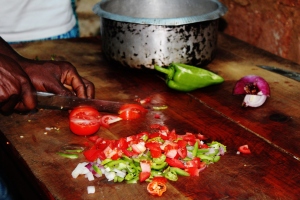 the sauce, which is a mixture of hot red and green peppers, onions, tomatoes, carrots, and ginger—all things delicious. The master chef who makes the pili pili invited us to watch how he makes it, so we jumped at the opportunity and were there the next morning.
the sauce, which is a mixture of hot red and green peppers, onions, tomatoes, carrots, and ginger—all things delicious. The master chef who makes the pili pili invited us to watch how he makes it, so we jumped at the opportunity and were there the next morning.
He started by chopping up all the vegetables into a lovely, colorful pile. Although he was very speed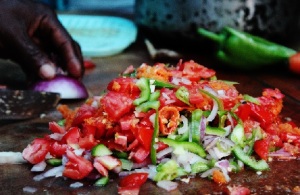 y with the knife, he was very careful not to leave any pieces behind. You need all the vegetables you can get since it doesn’t make a huge amount. Next, he put the pile of veggies onto a frying pan and cooked them for about 5-10 minutes, adding salt and whatever else he thought it needed. When that was done, the pili pili was finished. The most exciting part happened next: he packed the pili pili into a container and gave it to us. It was so nice of him and so unexpected, so we gave him some shilingi and hurried away to dive into the deliciousness.
y with the knife, he was very careful not to leave any pieces behind. You need all the vegetables you can get since it doesn’t make a huge amount. Next, he put the pile of veggies onto a frying pan and cooked them for about 5-10 minutes, adding salt and whatever else he thought it needed. When that was done, the pili pili was finished. The most exciting part happened next: he packed the pili pili into a container and gave it to us. It was so nice of him and so unexpected, so we gave him some shilingi and hurried away to dive into the deliciousness.
The reason I’m dedicating half a blog post to it is because it really was the best pili pili I’ve ever had. I can’t explain the flavor but it was the perfect combination of fresh veggies and spiciness and I literally could’ve eaten it all with a spoon. I don’t know if it’s because I saw the work that was put into it, or because of the buildup as I was drooling the entire time, but I remember saying that when I die and go to heaven, that pili pili is going to be greeting me at the gates. (drama intended)
To continue with this post about food, I’m going to talk about this past Sunday, when we all got cooking lessons from some Tanzanian “Mamas.” The plan was that we would learn to make traditional African foods like ugali (corn flour dough-like mixture), wali (rice), viazi (potatoes), and chapati (crepe-like tortillas). The Mamas greeted us with smiles when we arrived and we split into small groups for closer instruction. The task I helped with was preparing green beans, which are not green beans the vegetable, but actual beans that are green. My roomie Tunukiwa was there to help, and she first put a huge bag of the green beans on the ground for us to sort through and take out any that were bad (i.e. brown). What I thought would be a 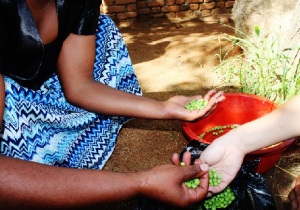 quick process ended up taking over a half hour—and that was just the first step! When we were done sorting, we had to wash the green beans, which again I thought would be quick. Instead, it took about twenty minutes because we washed them about five times and since there were no strainers, we scooped them back and forth into the water with our hands. When they were finally rinsed, we cooked the green beans in a pot over the “stove,” which was an open fire fueled by wood and coal. The process didn’t end there, because we then chopped vegetables to add to the beans.
quick process ended up taking over a half hour—and that was just the first step! When we were done sorting, we had to wash the green beans, which again I thought would be quick. Instead, it took about twenty minutes because we washed them about five times and since there were no strainers, we scooped them back and forth into the water with our hands. When they were finally rinsed, we cooked the green beans in a pot over the “stove,” which was an open fire fueled by wood and coal. The process didn’t end there, because we then chopped vegetables to add to the beans.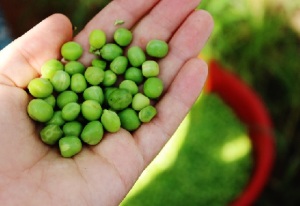
Without cutting boards or peelers, chopping the vegetables took a lot of focus and caution. After carefully grating and chopping a few carrots with just my hands and a knife, I braved the tomatoes. The tomatoes were extra intimidating because they had to be peeled, again with just a knife (they tend to be slippery too). The entire process took a lot of patience and concentration, which was actually pretty Zen because my entire focus was on the vegetable in my hand and nothing else. Being completely absorbed in the present moment like that has been a common theme of this trip for me, which is something I appreciate. Tasks that seem trivial at home, like washing clothes, are fairly time-consuming here and pull you out of the mindset that you have to rush to get as much done as you can in a short amount of time. The simple task of peeling tomatoes reminded me of a quote by the philosopher Alan Watts: “Zen does not confuse spirituality with thinking about God while one is peeling potatoes. Zen spirituality is just to peel the potatoes.”
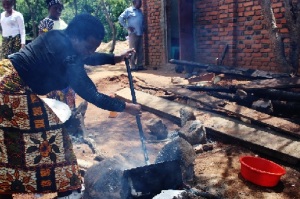 Anyways, the entire process of cooking the different foods took about three hours. I don’t think I’ve ever worked for three hours straight like that for a single meal—I really admire the Mamas and all their hard work. What was a long, laborious morning for us Wazungus was just another day in the life of these women. As I was struggling to stir the almost-finished ugali, one Mama helped me out by taking the long wooden spoon from me and finishing it off without breaking a sweat, a smile on her face the entire time. They make it look so easy!
Anyways, the entire process of cooking the different foods took about three hours. I don’t think I’ve ever worked for three hours straight like that for a single meal—I really admire the Mamas and all their hard work. What was a long, laborious morning for us Wazungus was just another day in the life of these women. As I was struggling to stir the almost-finished ugali, one Mama helped me out by taking the long wooden spoon from me and finishing it off without breaking a sweat, a smile on her face the entire time. They make it look so easy!

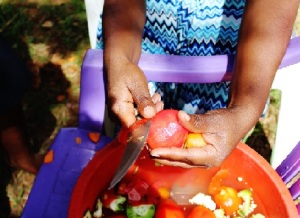

Amazing experiences. Can’t wait to sample what you learned in the cooking lessons!
LikeLike